Horseradish (Armoracia rusticana) may support immune health, digestion, and detoxification thanks to its rich concentration of antioxidants and sulfur-based compounds. This pungent root, known for its sharp aroma and spicy flavor, belongs to the Brassicaceae family—the same group as mustard, wasabi, and cabbage. Beyond its culinary use, horseradish has been studied for its potential to support respiratory comfort, microbial balance, and liver health.
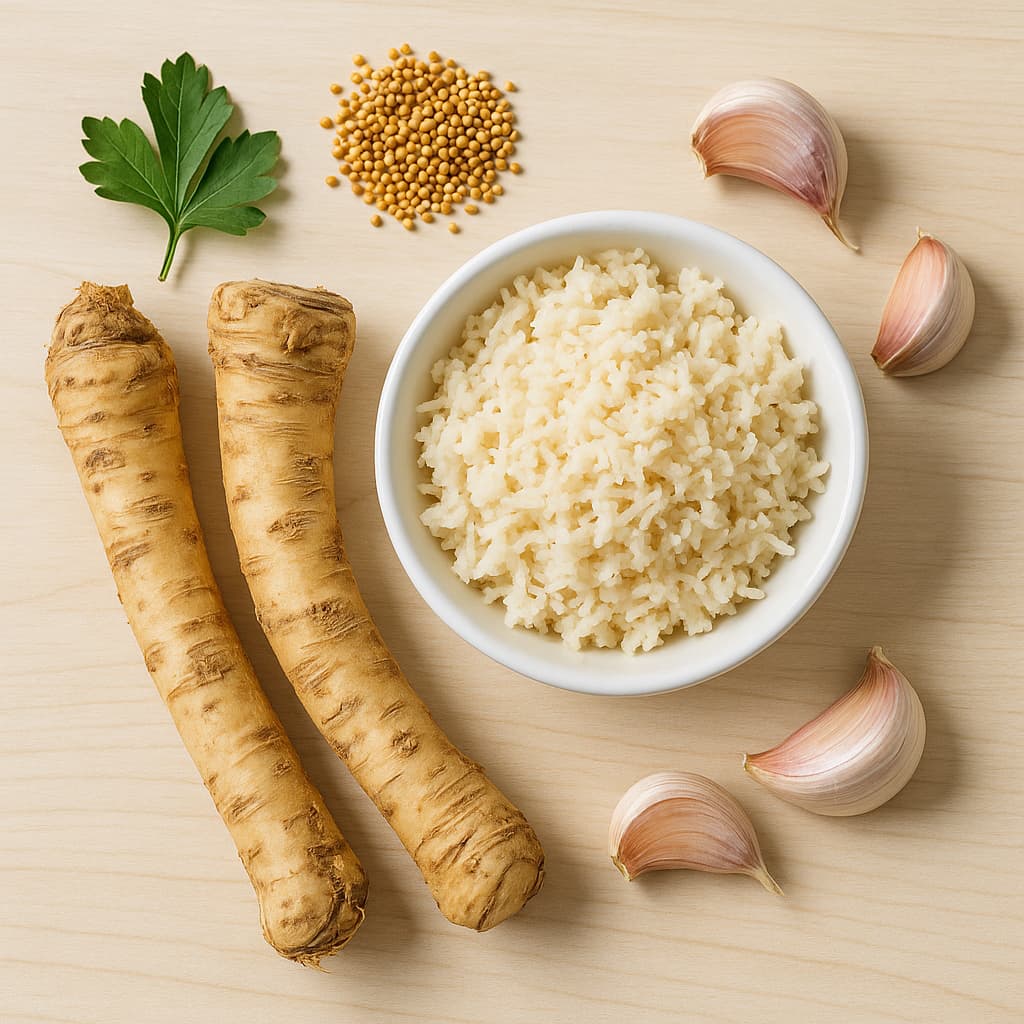
Understanding the nutritional and functional properties of horseradish is key to using it safely and effectively. It is naturally low in calories yet rich in vitamin C, fiber, potassium, calcium, and glucosinolates, compounds that may activate antioxidant and detoxification pathways in the body. Including moderate amounts of horseradish in your diet can enhance flavor while supporting overall wellness.
What Is Horseradish?
Horseradish (Armoracia rusticana) is a pungent root vegetable belonging to the Brassicaceae family — the same plant group as mustard, wasabi, cabbage, and broccoli. Native to Eastern Europe, it has been cultivated for centuries both as a flavorful condiment and for its potential wellness benefits.
When the root is grated or crushed, enzymes convert compounds called glucosinolates into allyl isothiocyanate, releasing its signature sharp aroma and heat. This natural reaction not only gives horseradish its bold flavor but also produces bioactive compounds studied for their antioxidant, antimicrobial, and detoxification-supporting properties.
Historically, horseradish was used across European and Asian cuisines to enhance meat and fish dishes, while traditional medicine valued it for promoting digestion and respiratory comfort. Today, its reputation continues to grow as both a culinary staple and a functional food ingredient within the cruciferous vegetable family.
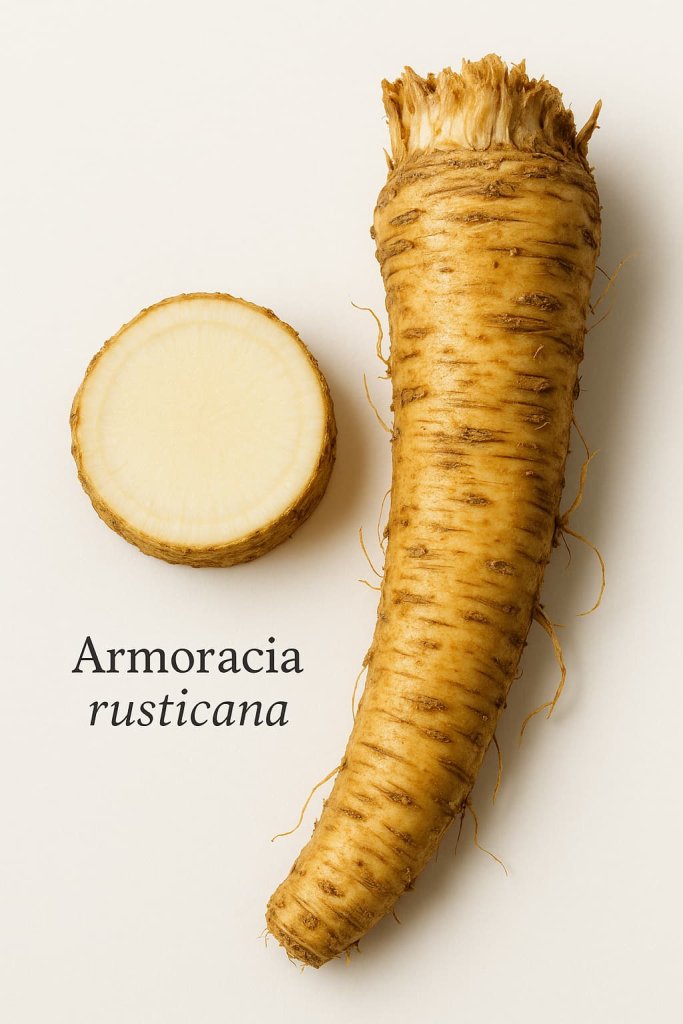
Nutritional Profile of Horseradish
Horseradish is a low-calorie, nutrient-dense root that adds flavor without excess fat or sodium. Despite being used in small amounts, it provides several important micronutrients and phytochemicals that contribute to overall wellness.
According to the USDA FoodData Central, 100 g of prepared horseradish provides the following:
| Nutrient | Amount (per 100 g) | % Daily Value* |
|---|---|---|
| Calories | 48 kcal | — |
| Carbohydrates | 11 g | 4 % |
| Dietary Fiber | 3.3 g | 12 % |
| Protein | 1.2 g | 2 % |
| Fat | 0.7 g | 1 % |
| Vitamin C | 24.9 mg | 28 % |
| Calcium | 56 mg | 4 % |
| Potassium | 246 mg | 7 % |
| Folate | 57 µg | 14 % |
*Percent Daily Values are based on a 2,000 calorie diet.
Horseradish’s high vitamin C content supports immune and skin health, while fiber aids digestion and satiety. Its potassium and calcium contribute to normal muscle and heart function, and folate supports cellular growth and metabolism.
Because it’s naturally low in calories and sugar, horseradish can help enhance meals while aligning with balanced, nutrient-focused eating patterns recommended by public health authorities such as the Harvard T.H. Chan School of Public Health.
10 Proven Health Benefits of Horseradish (Backed by Science)
1. Rich in Antioxidants
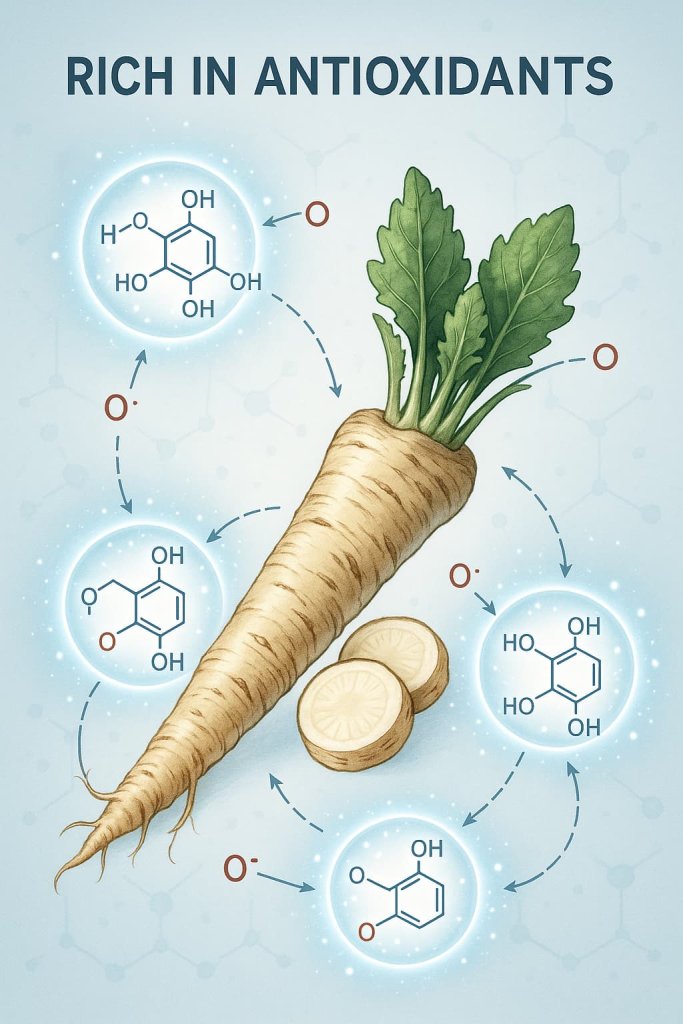
Horseradish is rich in antioxidants such as vitamin C, phenolic compounds, and flavonoids that may help protect cells from oxidative stress. These natural compounds support cellular health by neutralizing harmful free radicals that contribute to aging and chronic inflammation.
A 2022 review in Molecules (MDPI) found that horseradish extracts demonstrated significant antioxidant capacity, comparable to other cruciferous vegetables, helping maintain healthy cellular function.
2. Supports Immune Function
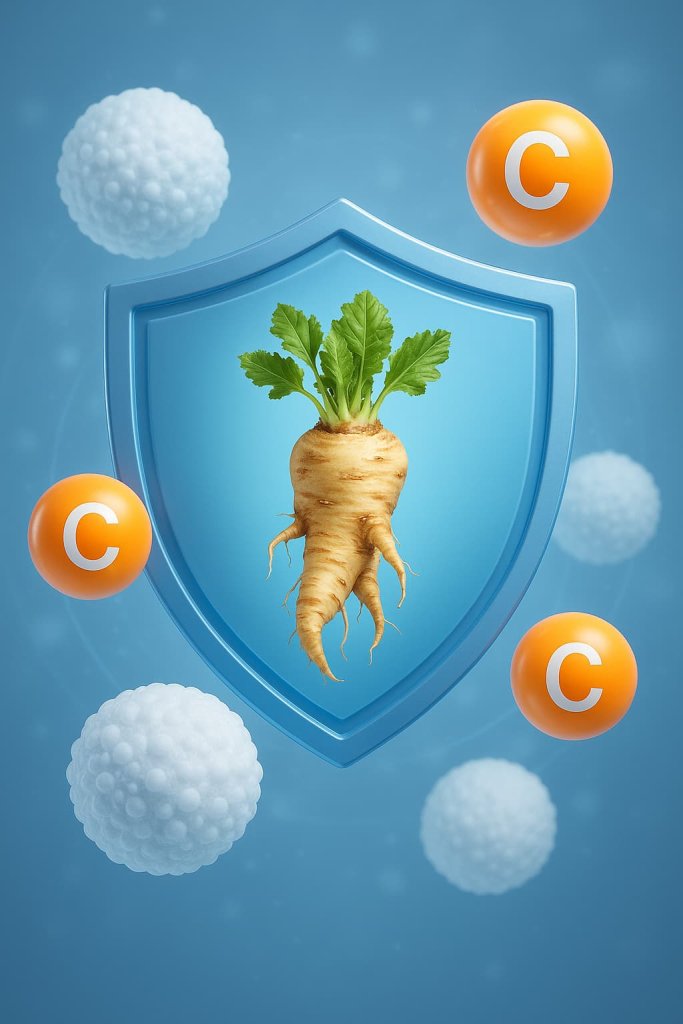
Horseradish contains vitamin C and glucosinolates, two compounds that may support the body’s natural immune defenses. Vitamin C acts as a powerful antioxidant that helps protect immune cells from oxidative damage, while glucosinolates — sulfur-containing compounds found in cruciferous vegetables — can be converted into bioactive isothiocyanates that may stimulate immune response pathways.
A 2021 study published in Frontiers in Pharmacology highlighted that glucosinolates and their metabolites may influence immune cell signaling, antioxidant activity, and inflammation modulation, contributing to overall immune resilience. Including moderate amounts of horseradish as part of a balanced diet may therefore help support your body’s natural defenses in a safe, food-based way.
3. Natural Antimicrobial Properties

The distinctive heat of horseradish comes from allyl isothiocyanate (AITC) — a sulfur-based compound known for its natural antimicrobial activity. Research shows that AITC may help inhibit the growth of harmful microorganisms such as Escherichia coli O157:H7, Listeria monocytogenes, and Staphylococcus aureus, which are common causes of foodborne illness.
A 2020 study published in the Journal of Food Protection found that allyl isothiocyanate derived from horseradish significantly reduced bacterial contamination in stored foods, suggesting its potential use as a natural food preservative. Additionally, a review on isothiocyanates in Frontiers in Microbiology (2018) confirmed that these plant compounds may disrupt bacterial cell membranes and interfere with metabolic activity, reinforcing their antimicrobial value.
While horseradish adds a bold flavor to foods, its bioactive compounds may also help support food safety naturally when used as part of hygienic food preparation and balanced nutrition.
4. May Support Respiratory Health

For centuries, horseradish has been valued in traditional European medicine for supporting respiratory comfort. Its pungent vapors may temporarily open nasal passages and promote mucus clearance, offering relief from mild congestion.
The Cleveland Clinic (2023) notes that the root’s volatile oils can stimulate sinus drainage and support breathing comfort, though it should not replace medical treatments for respiratory conditions.
5. Promotes Digestive Function
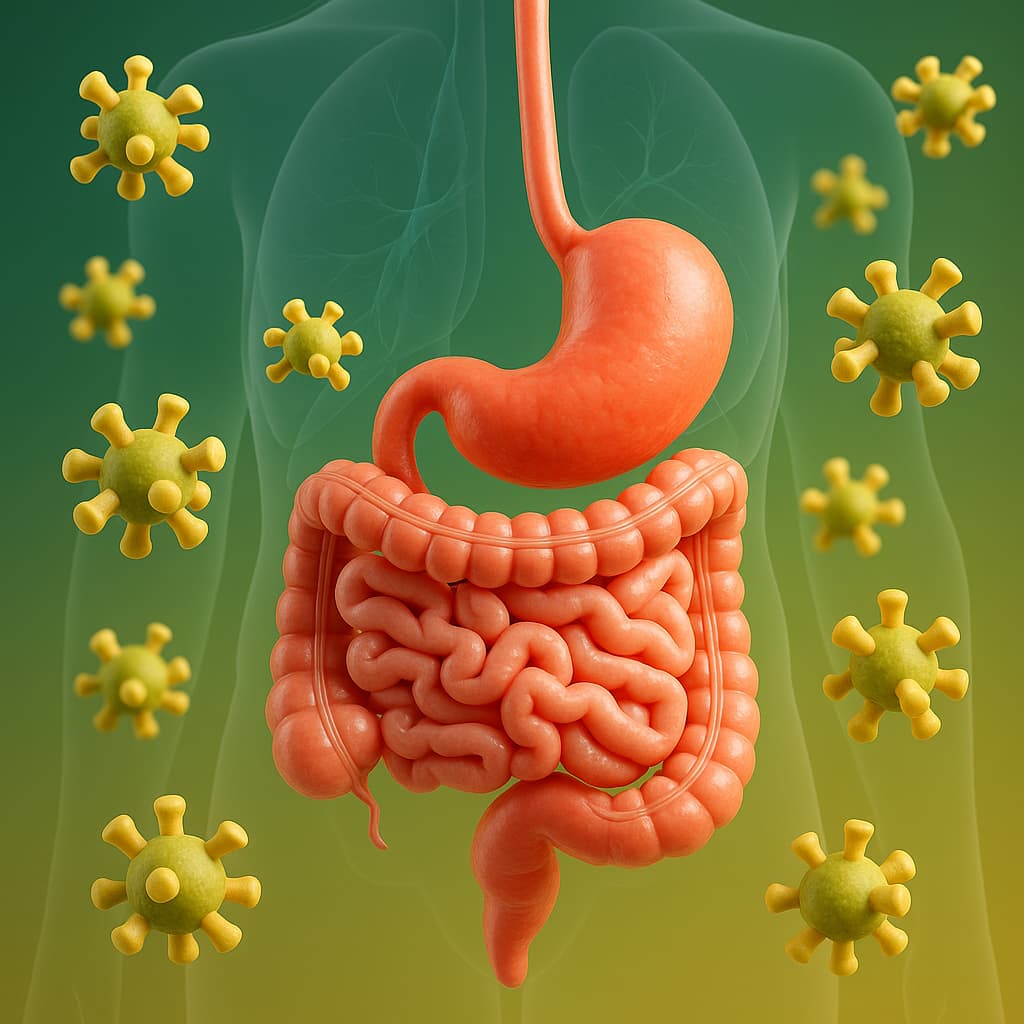
Horseradish’s natural compounds may stimulate gastric juices and digestive enzymes, helping improve nutrient breakdown and absorption. The slight heat of the root also acts as a carminative, potentially reducing gas formation.
According to a 2021 review in the Journal of Ethnopharmacology, phenolic compounds in horseradish and related plants can support gastrointestinal balance by enhancing digestive secretions and modulating gut bacteria.
6. Supports Detoxification and Liver Function

Horseradish is naturally rich in sulfur compounds such as isothiocyanates that may activate the liver’s detoxification enzymes. These enzymes play an important role in processing toxins and metabolic byproducts.
A study published in Nutrients (2022) reported that glucosinolate-derived compounds can stimulate phase II detoxification pathways in the liver, promoting efficient cleansing and antioxidant defense.
7. May Help Maintain Healthy Weight
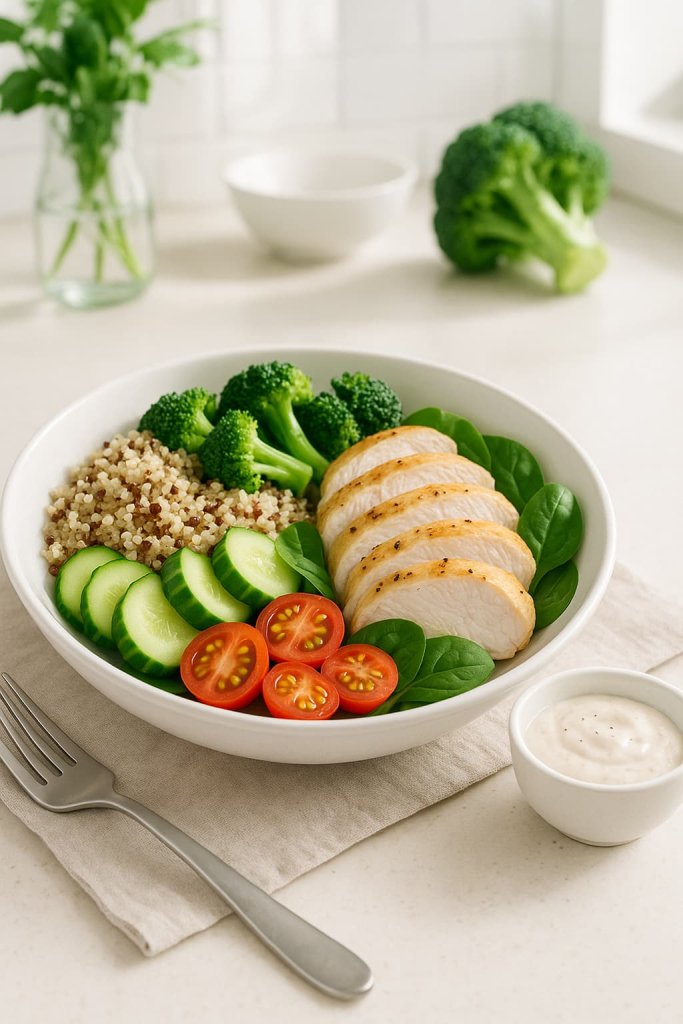
Low in calories yet rich in flavor, horseradish can enhance dishes without adding fat or sugar — making it an excellent condiment for those managing calorie intake. Its strong, spicy taste may also help increase satiety, which can naturally support portion control.
Because horseradish adds taste intensity, it may help reduce reliance on high-sodium or high-fat sauces, aligning with dietary guidance from the Centers for Disease Control and Prevention (CDC) for reducing sodium intake to support cardiovascular wellness.
8. Supports Urinary Tract Health

Horseradish contains isothiocyanates, sulfur-based compounds that may support urinary tract wellness by promoting urine flow and discouraging bacterial growth. A 2024 study in Frontiers in Pharmacology found that a herbal combination with horseradish root significantly reduced urinary tract infection recurrence and antibiotic use compared to standard care. These findings suggest horseradish’s natural antimicrobial compounds may complement urinary health. However, experts, including the National Center for Complementary and Integrative Health (NCCIH), recommend using herbal ingredients as part of a balanced diet, not as medical treatment. Use horseradish moderately to support bladder comfort naturally.
9. May Promote Heart Health
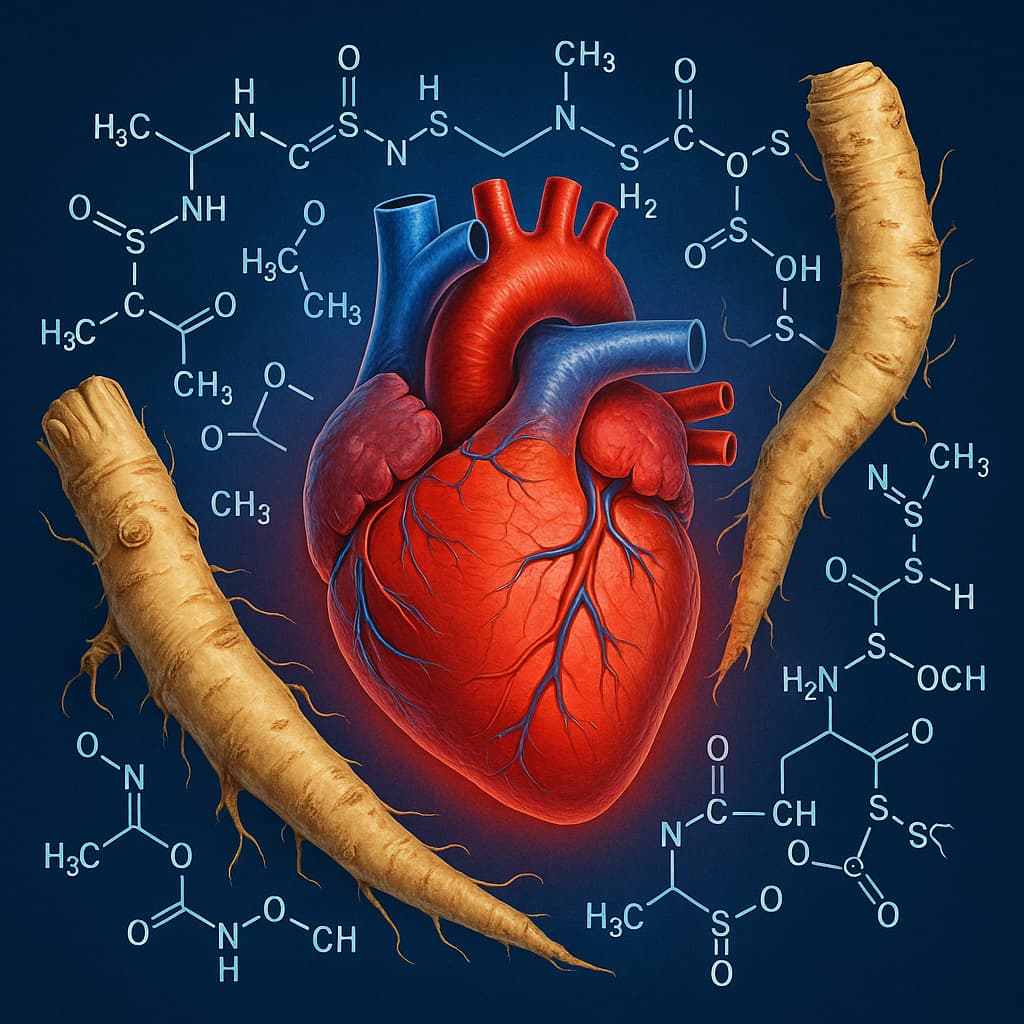
Cruciferous vegetables like horseradish contain compounds that may support healthy blood pressure and cholesterol levels by reducing oxidative stress in the vascular system.
A 2021 report in the Journal of Agricultural and Food Chemistry showed that glucosinolate metabolites may help preserve endothelial function — the lining of blood vessels — contributing to better cardiovascular balance when consumed as part of a heart-healthy diet.
10. Contributes to Overall Wellness
Horseradish combines antioxidants, fiber, and immune-supporting nutrients, making it a versatile addition to a balanced wellness diet. Regular inclusion of small amounts — such as 1–2 teaspoons with meals — may support metabolic balance, digestion, and overall vitality.
As the Harvard T.H. Chan School of Public Health recommends, incorporating cruciferous vegetables like horseradish supports long-term health through a diet rich in diverse plant compounds and nutrients.
How to Use Horseradish for Best Results
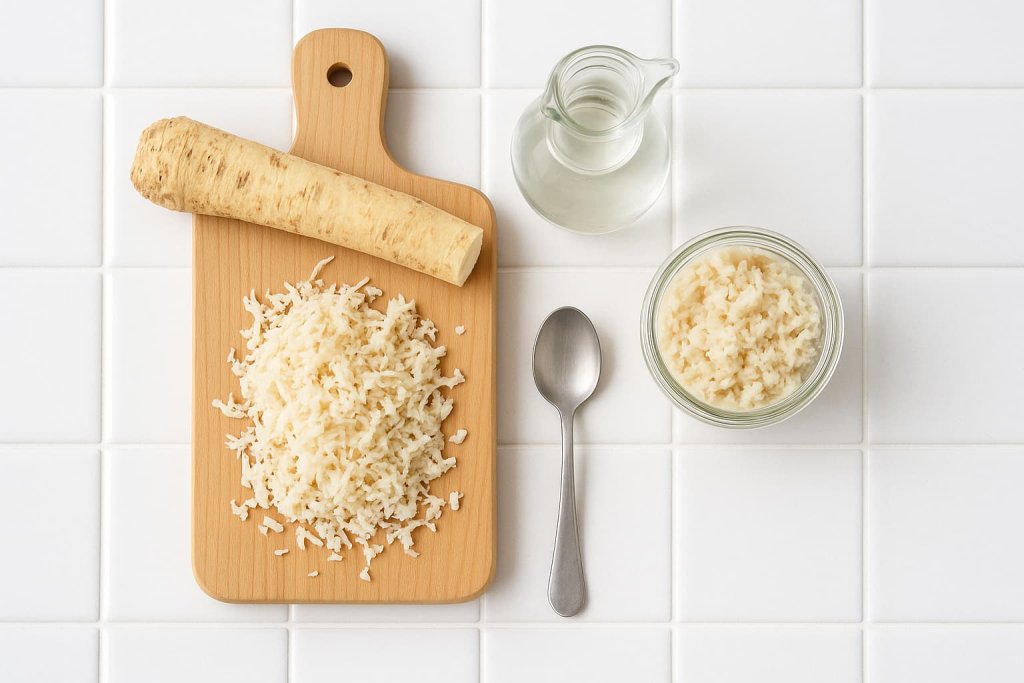
Using horseradish safely and effectively centers on moderation, freshness, and proper food storage to retain its nutrients and flavor.
1. Safe Serving Size
Limit intake to about 1–2 teaspoons of prepared horseradish per meal. This portion provides valuable plant compounds such as isothiocyanates without irritating the digestive tract.
2. Ways to Use
- Freshly grated root: Offers the strongest flavor and highest enzyme activity.
- Prepared horseradish: Typically mixed with vinegar to preserve its pungency and shelf life.
- Horseradish sauce or dressing: Enhances seafood, lean meats, or roasted vegetables with a naturally spicy zest.
3. Smart Pairings for Nutrition
Combine horseradish with lean proteins (e.g., fish, poultry, tofu) or cruciferous vegetables like broccoli and kale to support detoxification and antioxidant activity. Adding a teaspoon to whole grains such as quinoa or brown rice complements digestion and promotes satiety.
4. Storage and Shelf Life
- Keep fresh horseradish root refrigerated at or below 4 °C (40 °F) to maintain its potency and prevent spoilage.
- After grating, store in an airtight glass container with vinegar for up to 3–4 weeks.
- Avoid freezing, as it can dull the flavor and reduce beneficial enzyme activity.
For official guidance on safe food storage, handling, and refrigeration practices, refer to the U.S. Food and Drug Administration’s “Buy, Store & Serve Safe Food” resource. This source provides current, evidence-based recommendations to help prevent foodborne illness and maintain quality when handling fresh produce like horseradish.
Possible Side Effects and Precautions
Horseradish is generally safe when consumed in small, culinary amounts, but excessive intake or concentrated supplements can cause irritation or discomfort. Following safe consumption and storage guidelines helps prevent adverse reactions.
1. Gastric Irritation
The natural pungency of horseradish comes from allyl isothiocyanate — a compound that may irritate the mouth, throat, or stomach lining when consumed in large quantities. Individuals with acid reflux, ulcers, or gastrointestinal sensitivity should use it sparingly and avoid highly concentrated preparations.
2. Thyroid Concerns
Like other cruciferous vegetables, horseradish contains goitrogenic compounds that can interfere with thyroid hormone production in those with iodine deficiency. Moderate consumption within a balanced diet is considered safe for most people.
3. Pregnancy, Breastfeeding, and Children
Horseradish is not recommended during pregnancy or breastfeeding, and it should be avoided by young children due to its strong volatile oils, which can cause throat and stomach irritation.
4. Safe Food Handling and Storage
Always use clean utensils and store horseradish properly to prevent bacterial contamination. Keep fresh horseradish refrigerated at or below 4 °C (40 °F) and use prepared varieties before their expiration date.
For verified information on safe food storage and handling, refer to the U.S. Food and Drug Administration’s “Are You Storing Food Safely?” guide, which outlines best practices for refrigeration, cross-contamination prevention, and foodborne illness reduction.
FAQs About Horseradish and Health
Q1. Is horseradish safe to eat every day?
Yes, in small culinary amounts (1–2 teaspoons), horseradish is generally safe for most adults as part of a balanced diet.
Q2. Can horseradish support the immune system?
Yes, it contains vitamin C and glucosinolates that may support immune function by reducing oxidative stress and promoting healthy white blood cell activity.
Q3. What’s the difference between fresh and prepared horseradish?
Fresh horseradish is more potent and nutrient-rich, while prepared horseradish (mixed with vinegar) has a milder, longer-lasting flavor.
Q4. Can horseradish trigger allergies?
Rarely, but mild allergic reactions such as throat irritation or digestive discomfort may occur. Discontinue use if symptoms appear and consult a healthcare provider.
Q5. How long does horseradish stay fresh?
Fresh roots can last up to 4 weeks in the refrigerator. Prepared horseradish in a sealed jar can last several months if kept cold.
Q6. Can horseradish interact with medications?
It may irritate the stomach when combined with certain anti-inflammatory drugs or thyroid medications. Always seek medical advice if using regularly.
Q7. What’s the best way to include horseradish in a healthy diet?
Use it as a flavorful condiment rather than a supplement. Pair with vegetables, fish, or lean meats to enhance meals without added calories.
Conclusion
Horseradish is more than a spicy root — it’s a nutrient-dense cruciferous vegetable that may support immune, digestive, and metabolic health. Backed by scientific research, its bioactive compounds, including vitamin C and isothiocyanates, contribute to antioxidant defense and overall wellness when enjoyed in moderation.
Including small amounts of fresh or prepared horseradish in your meals can enhance both flavor and nutrition naturally. Always use it responsibly, store it safely, and combine it with a variety of wholesome foods for maximum benefit.
This content is for informational purposes only and not medical advice.
References:
- Cleveland Clinic – Horseradish Benefits and Nutrition Facts (2023)
- Frontiers in Pharmacology (2021) – Glucosinolates and Isothiocyanates in Cruciferous Vegetables
- PubMed (2020) – Antimicrobial Activity of Allyl Isothiocyanate in Food Systems
- Urologia Internationalis (Karger, 2024) – Horseradish Root and Nasturtium Herb in UTI Prevention
- National Center for Complementary and Integrative Health (NCCIH) – Using Herbal Supplements Wisely
